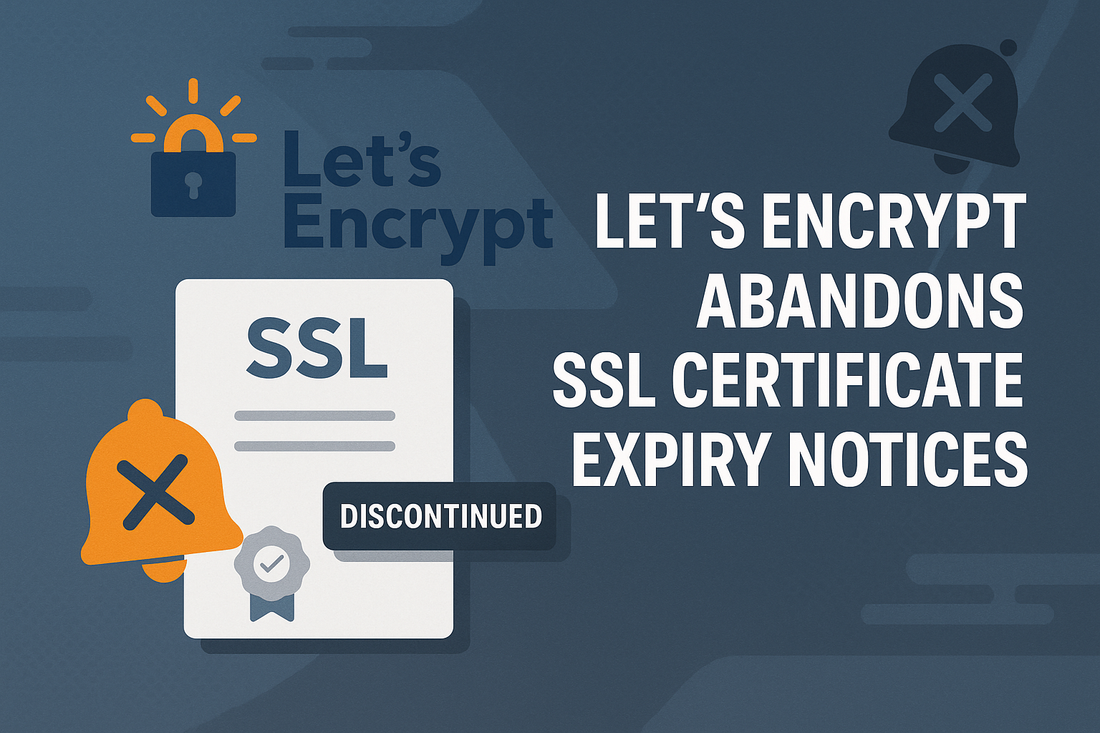
Let’s Encrypt Abandons SSL Expiration Notifications
Emma ThompsonShare
In June 2024, Let's Encrypt 🔗 discontinued its expiration notification service, leaving millions of websites vulnerable to unexpected SSL Certificate outages.
Organizations relying on free SSL Certificates that expire every 90 days now face a critical business risk : what was once a minor administrative task has become a potential source of major service disruption.
The timing of this change is particularly challenging. With SSL Certificate adoption at an all-time high and search engines penalizing non-HTTPS sites, proper SSL Certificate management has never been more critical.
Yet many organizations still treat SSL Certificate renewal as an afterthought, discovering expired SSL Certificates only when customers report security warnings.
The Real Cost of SSL Certificate Expiration
When an SSL Certificate expires, visitors immediately encounter browser security warnings that destroy trust and drive traffic away. A major e-commerce platform recently reported losing $1.2 million in revenue from just four hours of SSL Certificate-related downtime during their peak sales period.
The damage extends far beyond immediate sales losses. Search engines like Google actively penalize sites with expired SSL Certificates, dropping rankings that can take months to recover. Customer trust erodes even faster : research shows that 85% of visitors will never return to a site after encountering an SSL Certificate warning.
Let's Encrypt SSL Certificates compound this risk through their 90-day expiration cycle. While commercial SSL Certificates typically last one to two years, free SSL Certificates require renewal four times more frequently, multiplying opportunities for human error or system failures.
Why Traditional Monitoring Approaches Fail
Many organizations discovered the inadequacy of their SSL Certificate monitoring only after Let's Encrypt ended notifications. IT teams had grown dependent on these external reminders, often lacking internal processes to track SSL Certificate expiration dates across multiple domains and servers.
The problem intensifies for organizations managing dozens or hundreds of SSL Certificates. Manual tracking through spreadsheets or calendar reminders inevitably fails as staff changes, priorities shift, or simple human error intervenes. One financial services company discovered 17 expired SSL Certificates during an audit, including three on customer-facing applications.
E-Mail-based notifications present their own challenges. Spam filters, employee turnover, and inbox overload mean critical SSL Certificate renewal notices often go unseen. We have observed cases where renewal notifications were sent to employees who left the company months earlier, leaving SSL Certificates to expire silently.
Building a Multi-Layer SSL Certificate Management Strategy
Trustico® has developed a comprehensive approach to SSL Certificate management based on redundancy and automation. Our commercial SSL Certificates include built-in monitoring with notifications sent before expiration through multiple channels.
However, we strongly advocate implementing additional monitoring layers. No single system should be trusted with something as critical as SSL Certificate renewal. This philosophy saved one of our enterprise clients from a potentially catastrophic outage when their primary e-mail system began filtering renewal notices as spam.
Their secondary monitoring system, a third-party service checking SSL Certificate validity every six hours, detected the pending expiration with 48 hours remaining. This redundancy prevented what could have been millions in lost revenue during their busiest quarter.
Implementing Third-Party SSL Certificate Monitoring
Independent monitoring services provide crucial verification of SSL Certificate status across your entire infrastructure. These tools operate outside your primary systems, offering an objective view of SSL Certificate health and configuration.
For small to medium businesses, Uptime Robot 🔗 offers free monitoring for up to 50 endpoints, checking SSL Certificate validity alongside general uptime. The service sends alerts via e-mail, SMS, Slack, and webhook, ensuring notifications reach the right people through their preferred channels.
StatusCake 🔗 provides similar capabilities with additional features like status pages and multi-location monitoring. Their free tier includes SSL Certificate checks from multiple geographic locations, helping identify regional SSL Certificate issues that might affect only certain users.
Site24x7 🔗 adds sophisticated dashboard visualization and historical tracking, allowing teams to spot patterns in SSL Certificate management. Their reporting features help demonstrate compliance with security policies and identify SSL Certificates approaching expiration across large infrastructures.
Popular monitoring solutions include Uptime Robot, StatusCake, Site24x7, and Pingdom 🔗, which offer free tiers for basic monitoring. Enterprise solutions like DataDog 🔗 and New Relic 🔗 provide comprehensive infrastructure monitoring including SSL Certificate tracking.
Selecting the Right SSL Certificate Type
While monitoring prevents expiration, choosing appropriate SSL Certificate types and validity periods reduces overall risk. Trustico® offers several SSL Certificate options designed for different organizational needs and risk profiles.
Domain Validated (DV) SSL Certificates provide basic encryption within minutes, ideal for development environments or internal applications. The automated validation process ensures rapid deployment without manual intervention, though these SSL Certificates offer minimal identity verification.
Organization Validated (OV) SSL Certificates add business verification, displaying company details in the SSL Certificate information. This additional validation provides visitors with confidence that they are connecting to a legitimate business, not an imposter site.
Extended Validation (EV) SSL Certificates undergo the most rigorous verification process, requiring legal, physical, and operational validation. While browser indicators have evolved, EV SSL Certificates remain the gold standard for e-commerce and financial services where trust is paramount.
Organizations managing multiple domains benefit significantly from Multi-Domain SSL Certificates, which can secure up to 250 domains with a single expiration date. This consolidation dramatically simplifies renewal management, reducing the risk of overlooking individual SSL Certificates.
Wildcard SSL Certificates protect unlimited subdomains under a single domain, perfect for SaaS platforms or organizations with dynamic subdomain creation. Rather than managing dozens of individual SSL Certificates, a single Wildcard SSL Certificate covers all current and future subdomains.
The Trustico® Support Advantage
Beyond SSL Certificate provisioning, Trustico® provides comprehensive support throughout the SSL Certificate lifecycle. Our team actively manages the validation process, often completing OV validation within hours rather than the industry standard of several days.
We maintain direct relationships with validation authorities, allowing us to expedite verification and resolve issues that might delay self-service requests. When a client recently needed emergency SSL Certificate replacement after a security incident, we completed the entire process in under two hours.
Our support team helps architect SSL Certificate strategies for complex deployments including load-balanced environments, CDN integrations, and multi-cloud infrastructures. We have guided organizations through consolidating hundreds of SSL Certificates into manageable groups with synchronized renewal dates.
This consolidation approach recently helped a retail client reduce their SSL Certificate management overhead by 80%, freeing their IT team to focus on strategic initiatives rather than constant renewal cycles. By aligning expiration dates and implementing proper monitoring, they eliminated emergency renewals entirely.
Best Practices for SSL Certificate Management
Effective SSL Certificate management requires documented processes and clear responsibilities. Designate primary and backup personnel responsible for SSL Certificate renewals, ensuring coverage during vacations or staff transitions.
Maintain a central inventory of all SSL Certificates including expiration dates, responsible parties, and associated domains. This documentation proves invaluable during audits and helps identify consolidation opportunities.
Test your renewal process regularly. Perform practice renewals on non-critical SSL Certificates to ensure your team understands the process and has necessary access credentials. Many organizations discover problems with their renewal process only when facing an imminent expiration.
Implement automated deployment where possible. Modern infrastructure tools can automatically deploy renewed SSL Certificates across multiple servers, reducing manual effort and potential for error. However, always verify automated deployments actually complete successfully.
Taking Action on SSL Certificate Monitoring
The end of Let's Encrypt notifications represents a critical moment for SSL Certificate management. Organizations must act now to implement robust monitoring before experiencing their first unexpected expiration.
Start by auditing all active SSL Certificates across your infrastructure. Document expiration dates, certificate types, and associated systems. Identify any SSL Certificates approaching expiration in the next 90 days for immediate attention.
Implement at least two independent monitoring systems with different notification methods. Configure alerts to reach multiple team members through various channels, ensuring someone always receives expiration warnings regardless of individual availability.
Consider transitioning critical systems to commercial SSL Certificates with longer validity periods and professional support. While free SSL Certificates serve a purpose, the hidden costs of management and risk often exceed the price of commercial alternatives.
Trustico® stands ready to help organizations navigate this transition. Our team can assess your current SSL Certificate infrastructure, recommend appropriate certificate types, and implement comprehensive monitoring strategies. Contact us to discuss how we can protect your services from unexpected SSL Certificate expirations while reducing your overall management burden.



